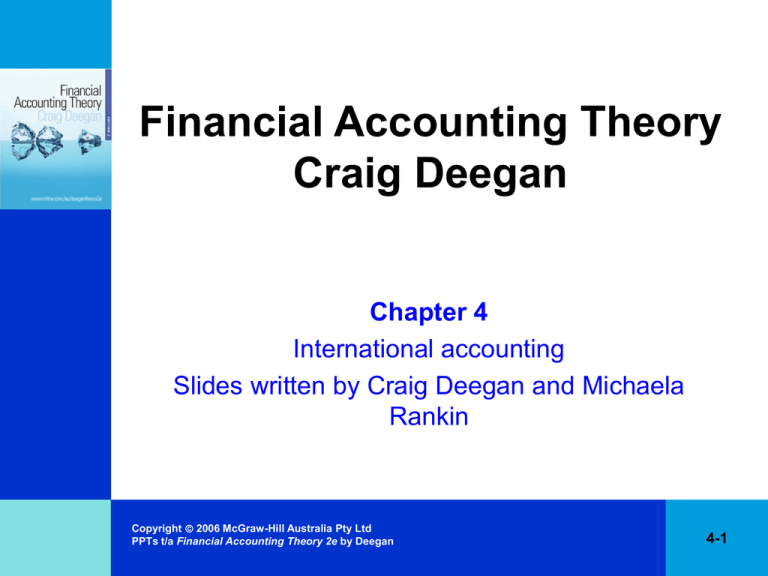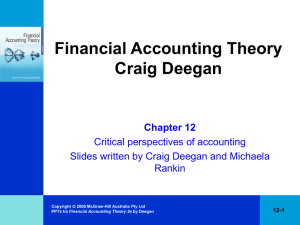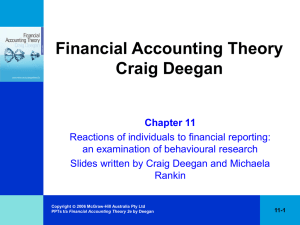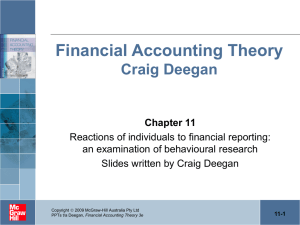ACCOUNTING Financial and Organisational Decision Making
advertisement

Financial Accounting Theory Craig Deegan Chapter 4 International accounting Slides written by Craig Deegan and Michaela Rankin Copyright 2006 McGraw-Hill Australia Pty Ltd PPTs t/a Financial Accounting Theory 2e by Deegan 4-1 Learning objectives • In this chapter you will be introduced to – an appreciation that there are many differences between some countries in the accounting policies and practices adopted – various explanations about why countries adopt particular accounting practices in preference to others – some of the arguments that suggest that it is appropriate that there are international differences in accounting practices Copyright 2006 McGraw-Hill Australia Pty Ltd PPTs t/a Financial Accounting Theory 2e by Deegan 4-2 Learning objectives (cont.) – what is meant by the terms harmonisation and standardisation as they apply to international accounting – some of the perceived benefits of standardising accounting practices on an international scale – some of the obstacles to harmonisation and standardisation, and the criticisms that efforts to harmonise and standardise accounting internationally have attracted Copyright 2006 McGraw-Hill Australia Pty Ltd PPTs t/a Financial Accounting Theory 2e by Deegan 4-3 Evidence of international differences in accounting • When we apply different countries’ accounting rules to the same transactions we can find significant differences in profits and net assets (consider Accounting Headline 4.1, p. 97) • The sometimes significant differences in accounting profits have been used by many parties to justify the ongoing efforts of the IASB to standardise international accounting Copyright 2006 McGraw-Hill Australia Pty Ltd PPTs t/a Financial Accounting Theory 2e by Deegan 4-4 International financial accounting models • Historically there have been two main models of financial accounting adopted internationally • Anglo-American model – strongly influenced by professional accounting bodies rather than government, emphasises importance of capital markets, emphasises true and fair, considerations of economic substance over legal form • Continental European Model – relatively small input from accounting profession, little reliance on qualitative true and fair, strong reliance on government Copyright 2006 McGraw-Hill Australia Pty Ltd PPTs t/a Financial Accounting Theory 2e by Deegan 4-5 Reasons for international accounting differences • • • • • Underlying laws and political systems Tax systems Level of education Level of economic development Nature of business ownership and financing system Copyright 2006 McGraw-Hill Australia Pty Ltd PPTs t/a Financial Accounting Theory 2e by Deegan 4-6 Reasons for international accounting differences (cont.) • • • • • • Colonial inheritance Taxation Culture History Language Religion Copyright 2006 McGraw-Hill Australia Pty Ltd PPTs t/a Financial Accounting Theory 2e by Deegan 4-7 The effect of culture on accounting systems • Impacts on legal systems, tax systems and the way businesses are formed and financed etc. • Previously used to explain differences in social systems • ‘… an expression of norms, values and customs which reflect typical behavioural characteristics’ (Takatera & Yamamoto 1987) Copyright 2006 McGraw-Hill Australia Pty Ltd PPTs t/a Financial Accounting Theory 2e by Deegan 4-8 The effect of culture on accounting systems (cont.) • ‘Culture’ reserved for societies as a whole or nations • ‘Subculture’ used for the level of an organisation, profession or family • International differences in accounting systems may be explained by a framework incorporating culture Copyright 2006 McGraw-Hill Australia Pty Ltd PPTs t/a Financial Accounting Theory 2e by Deegan 4-9 Hofstede’s cultural dimensions • Four underlying societal dimensions along which countries could be positioned – – – – Individualism versus Collectivism Large versus Small Power Distance Strong versus Weak Uncertainty Avoidance Masculinity versus Femininity Copyright 2006 McGraw-Hill Australia Pty Ltd PPTs t/a Financial Accounting Theory 2e by Deegan 4-10 Individualism versus Collectivism • Addresses degree of interdependence a society maintains among individuals – Individualism refers to a preference for a loosely knit social framework wherein individuals care for themselves and their immediate families – Collectivism stands for a tightly knit social framework where relatives, clan or other in-group look after each other Copyright 2006 McGraw-Hill Australia Pty Ltd PPTs t/a Financial Accounting Theory 2e by Deegan 4-11 Power Distance • Power Distance is the extent to which members of a society accept that power in institutions and organisations is distributed unequally – Large Power Distance societies accept a hierarchical order in which everyone has a place – Small Power Distance societies strive for power equalisation Copyright 2006 McGraw-Hill Australia Pty Ltd PPTs t/a Financial Accounting Theory 2e by Deegan 4-12 Uncertainty Avoidance • The degree to which the members of a society feel uncomfortable with uncertainty and ambiguity – Strong Uncertainty Avoidance societies maintain rigid codes of belief and behaviour – Weak Uncertainty Avoidance societies maintain a more relaxed atmosphere where practice counts more than principles Copyright 2006 McGraw-Hill Australia Pty Ltd PPTs t/a Financial Accounting Theory 2e by Deegan 4-13 Masculinity versus Femininity • Addresses the way in which a society allocates social roles – Masculinity stands for a preference for achievement, heroism, assertiveness and material success – Femininity stands for a preference for relationships, modesty, caring for the weak, and quality of life Copyright 2006 McGraw-Hill Australia Pty Ltd PPTs t/a Financial Accounting Theory 2e by Deegan 4-14 Societal dimensions and accounting subculture • The value systems of accountants are derived from related societal values • The values of the accounting subculture will in turn impact on the development of the respective accounting systems at a national level – should accounting systems be developed in a ‘one-sizefits-all’ approach? Copyright 2006 McGraw-Hill Australia Pty Ltd PPTs t/a Financial Accounting Theory 2e by Deegan 4-15 Gray’s accounting values • Gray developed four accounting values deemed to relate to the accounting subculture, with the intention of linking them to Hofstede’s four societal values – – – – professionalism versus statutory control uniformity versus flexibility conservatism versus optimism secrecy versus transparency Copyright 2006 McGraw-Hill Australia Pty Ltd PPTs t/a Financial Accounting Theory 2e by Deegan 4-16 Gray’s hypotheses • H1: The higher a country ranks in terms of Individualism and the lower it ranks in terms of Uncertainty Avoidance and Power Distance, the more likely it is to rank highly in terms of Professionalism • H2: The higher a country ranks in terms of Uncertainty Avoidance and Power Distance and the lower it ranks in terms of Individualism, then the more likely it is to rank highly in terms of Uniformity Copyright 2006 McGraw-Hill Australia Pty Ltd PPTs t/a Financial Accounting Theory 2e by Deegan 4-17 Gray’s hypotheses (cont.) • H3: The higher a country ranks in terms of Uncertainty Avoidance and the lower it ranks in terms of Individualism and Masculinity, then the more likely it is to rank highly in terms of Conservatism • H4: The higher a country ranks in terms of Uncertainty Avoidance and Power Distance and the lower it ranks in terms of Individualism and Masculinity, then the more likely it is to rank highly in terms of Secrecy Copyright 2006 McGraw-Hill Australia Pty Ltd PPTs t/a Financial Accounting Theory 2e by Deegan 4-18 Gray’s hypotheses (cont.) • Gray further hypothesised relationships between accounting values and – the authority and enforcement of accounting systems – the measurement and disclosure characteristics of accounting systems Copyright 2006 McGraw-Hill Australia Pty Ltd PPTs t/a Financial Accounting Theory 2e by Deegan 4-19 Other research using Hofstede’s cultural dimensions • Zarzeski (1996) – used Hofstede’s dimensions to explain corporate disclosure – entities with a higher international profile tend to be less secretive – local enterprises are more likely to disclose information commensurate with the secrecy of their culture than are international enterprises Copyright 2006 McGraw-Hill Australia Pty Ltd PPTs t/a Financial Accounting Theory 2e by Deegan 4-20 Other research using Hofstede’s cultural dimensions (cont.) • Perera (1989) – used Hofstede’s cultural dimensions and Gray’s accounting subcultural value dimensions to explain differences in the accounting practices of European and Anglo-American countries • Baydoun and Willett (1995) – investigated the use of the French United Accounting System in Lebanon Copyright 2006 McGraw-Hill Australia Pty Ltd PPTs t/a Financial Accounting Theory 2e by Deegan 4-21 The effect of religion on accounting systems • Religion transcends national boundaries • Impacts on global harmonisation of accounting standards • Hamid, Craig and Clarke (1993) examined how Islamic cultures have failed to embrace ‘Western’ accounting practices – compliance with Islamic beliefs can affect the structure of business and finance – many Western accounting practices are incompatible with Islamic principles – relevance of IASB standards to such cultures? Copyright 2006 McGraw-Hill Australia Pty Ltd PPTs t/a Financial Accounting Theory 2e by Deegan 4-22 The effect of religion on accounting systems (cont.) • Religion can affect how people do business and how they make decisions, for example – Islam precludes debt financing and prohibits payment of interest – the Western objective of financial reporting of rational economic decision making (refer to the conceptual frameworks discussed in Chapter 5) may not be a relevant objective in some societies Copyright 2006 McGraw-Hill Australia Pty Ltd PPTs t/a Financial Accounting Theory 2e by Deegan 4-23 Legal systems • Can be broadly divided into common law and Roman law systems – in Roman Law systems the law tends to be very detailed – in Common Law systems—which is how Australia can be classified—law typically evolves from the ruling of judges • In Common Law countries accounting practices tend to rely relatively heavily on professional judgment Copyright 2006 McGraw-Hill Australia Pty Ltd PPTs t/a Financial Accounting Theory 2e by Deegan 4-24 Business ownership and financing system • At a country level the financing system is relevant to the purpose of financial reporting • Three types of financing systems – capital market-based (e.g. United Kingdom and United States) – credit-based system: governmental (e.g. France and Japan) – credit-based system: financial institutions (e.g. Germany) Copyright 2006 McGraw-Hill Australia Pty Ltd PPTs t/a Financial Accounting Theory 2e by Deegan 4-25 Business ownership and financing system (cont.) • Systems relying on equity markets will have greater demand for public disclosures • Credit-based systems more concerned with the protection of creditors • Colonial inheritance also a major explanatory factor Copyright 2006 McGraw-Hill Australia Pty Ltd PPTs t/a Financial Accounting Theory 2e by Deegan 4-26 Taxation systems • Differences in accounting methods internationally have also been linked to differences in taxation systems • Where there are ‘insider systems of finance’ (common in continental European countries) financial accounting practices have typically been linked to taxation law Copyright 2006 McGraw-Hill Australia Pty Ltd PPTs t/a Financial Accounting Theory 2e by Deegan 4-27 Impact of international agencies • Examples of institutions or bodies which can impact on a country’s accounting policies are – multinational companies – international accounting firms – large monetary organisations e.g. World Bank Copyright 2006 McGraw-Hill Australia Pty Ltd PPTs t/a Financial Accounting Theory 2e by Deegan 4-28 Approaching international differences • Hence, to this point we can see that there are many explanations for international differences • Given the many factors that explain why international differences in accounting will, or perhaps should exist, then how logical are efforts towards international standardisation? Copyright 2006 McGraw-Hill Australia Pty Ltd PPTs t/a Financial Accounting Theory 2e by Deegan 4-29 Reasons for harmonisation and standardisation • There is a difference between harmonisation and standardisation • Some arguments in support of standardisation include – international investors are better able to understand the financial performance and position of local companies – tied to the above point, there is an expectation that standardisation will facilitate greater capital inflows – also tied to the above point, standardisation will make it easier for local companies to list on foreign stock exchanges Copyright 2006 McGraw-Hill Australia Pty Ltd PPTs t/a Financial Accounting Theory 2e by Deegan 4-30 Reasons for harmonisation and standardisation (cont.) – companies listed on several stock exchanges would only need to produce one set of financial statements and this will have implications for cost savings – the accounting and auditing staff employed by international organisations will be better able to move to other member companies – there will be cost savings in the accounting-standard setting function—rather than individual companies duplicating the efforts of others, the majority of functions of the standard-setting process will be centralised at the IASB Copyright 2006 McGraw-Hill Australia Pty Ltd PPTs t/a Financial Accounting Theory 2e by Deegan 4-31 Obstacles to standardisation • Effects on standard setting of different – – – – business environments legal systems cultures; and political environments in different countries • IASs and IFRS are strongly Anglo-American influenced • Relevance of IAS/IFRS to some countries is questioned • Economic implications of adopting a ‘new’ set of accounting standards Copyright 2006 McGraw-Hill Australia Pty Ltd PPTs t/a Financial Accounting Theory 2e by Deegan 4-32 International Accounting Standards Board (IASB) • The IASB replaced the IASC in 2001 (the IASC was formed in 1973) • IASB has 14 full-time members who have to sever their connections with other organisations • Australia decided in the mid-1990s to harmonise its standards with those of the IASC • In 2002 a decision was made by the Financial Reporting Council that Australia would adopt standards released by the IASB Copyright 2006 McGraw-Hill Australia Pty Ltd PPTs t/a Financial Accounting Theory 2e by Deegan 4-33 International Accounting Standards Board (IASB) (cont.) • The FRC’s decision created a great deal of work for organisations in that they had to make quite significant changes to their accounting practices • The adoption of IAS/IFRS required companies to write off a great deal of assets—particularly intangible assets • Worth the effort? Copyright 2006 McGraw-Hill Australia Pty Ltd PPTs t/a Financial Accounting Theory 2e by Deegan 4-34 Objectives of IASB • To formulate and publish accounting standards and to promote their worldwide acceptance • To work on the improvement and standardisation of regulations, accounting standards and procedures • The IASB does not appear to believe that the many reasons provided as to why different nations should have different accounting standards (e.g. tied to differences in culture, religion and so forth) outweigh the benefits of international standardisation Copyright 2006 McGraw-Hill Australia Pty Ltd PPTs t/a Financial Accounting Theory 2e by Deegan 4-35 Aims of IASC/IASB • Short-term aim—for national accounting standards and IASs to converge • Long-term aim of global uniformity—a single set of accounting standards for all listed and economically significant business enterprises around the world Copyright 2006 McGraw-Hill Australia Pty Ltd PPTs t/a Financial Accounting Theory 2e by Deegan 4-36 International Organization of Securities Commissions (IOSCO) • Working with IASB, has assisted IAS/IFRS to achieve widespread acceptance • Developed a plan such that compliance with IAS/IFRS will allow an organisation to have securities listed in all global markets Copyright 2006 McGraw-Hill Australia Pty Ltd PPTs t/a Financial Accounting Theory 2e by Deegan 4-37 International Federation of Accounting Committee (IFAC) • Concentrates on international issues associated with the practice of auditing and accounting education • Also issues associated with ethical conduct Copyright 2006 McGraw-Hill Australia Pty Ltd PPTs t/a Financial Accounting Theory 2e by Deegan 4-38





